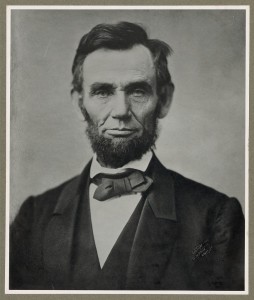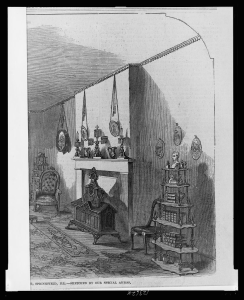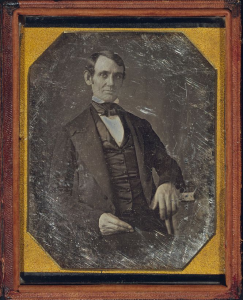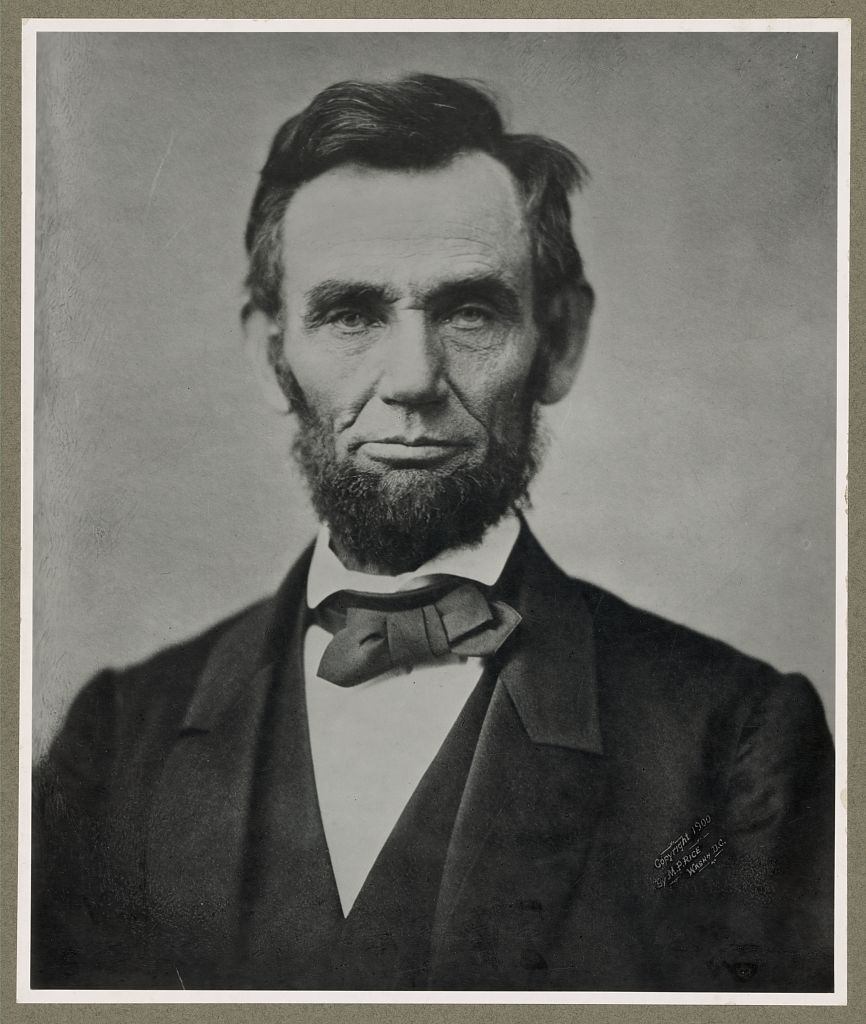
Who knew?
Abraham Lincoln picked up his pen not only to scratch out the Gettysburg Address and Second Inaugural Address. He also wrote poetry and true crime.
His one true crime short story, published in the Quincy Whig in April 1846, is based on a case he handled as a defense attorney. Lincoln’s client never paid him for getting him off on a murder charge, so Lincoln found another way to make money off the case. This story has a delightful twist at the end you’re not likely to forget. Since the story is now in the public domain, I’ve reproduced it for you below.
Lincoln’s true crime story is all the more relevant in 2014 because the author of a letter found in the walls of Lincoln’s Springfield home was identified this year. In 1987, during renovations of the house, a damaged, half-eaten letter to Lincoln was found in a mouse nest in the walls. The Abraham Lincoln Presidential Library and Museum announced in January that Andrew Johnston, editor of the Quincy Whig, wrote it on March 10, 1846. It was Johnston’s nephew, George Pickett, who led the ill-fated Pickett’s Charge at the Battle of Gettysburg.
In the mystery letter, Johnston addressed Lincoln’s poetry, not his true crime story. Lincoln had written Johnston on February 24, 1846 to say he was working on a poem, so the timing fits. Lincoln submitted “My Childhood Home” in April, 1846, the same month his true crime story appeared. Johnston published “My Childhood Home” in 1847.
Here’s Abraham:
**************************
A Remarkable Case of Arrest for Murder by Abraham Lincoln
(also known as The Trailor Murder Mystery)
In the year 1841, there resided, at different points in the State of Illinois, three brothers by the name of Trailor. Their Christian names were William, Henry and Archibald. Archibald resided at Springfield, then as now the seat of Government of the State. He was a sober, retiring, and industrious man, of about thirty years of age; a carpenter by trade, and a bachelor, boarding with his partner in business–a Mr. Myers. Henry, a year or two older, was a man of like retiring and industrious habits; had a family, and resided with it on a farm, at Clary’s Grove, about twenty miles distant from Springfield in a northwesterly direction.
—William, still older, and with similar habits, resided on a farm in Warren county, distant from Springfield something more than a hundred miles in the same North-westerly direction. He was a widower, with several children.
In the neighborhood of William’s residence, there was, and had been for several years, a man by the name of Fisher, who was somewhat above the age of fifty; had no family, and no settled home; but who boarded and lodged a while here and a while there, with persons for whom he did little jobs of work. His habits were remarkably economical, so that an impression got about that he had accumulated a considerable amount of money.
![General George E. Pickett; Library of Congress Prints & PHotographs Divison LOT 4213 [item] [P&P]](https://www.annmarieackermann.com/wp-content/uploads/2014/12/General-George-E.-Pickett-LOC-PP-Divison-LOT-4213-item-PP-222x300.bmp)
After dinner, the three Trailors and Fisher left the boarding house in company, for the avowed purpose of spending the evening together in looking about the town. At supper, the Trailers had all returned, but Fisher was missing, and some inquiry was made about him. After supper, the Trailers went out professedly in search of him. One by one they returned, the last coming in after late tea time, and each stating that he had been unable to discover anything of Fisher.
The next day, both before and after breakfast, they went professedly in search again, and returned at noon, still unsuccessful. Dinner again being had, William and Henry expressed a determination to give up the search, and start for their homes. This was remonstrated against by some of the boarders about the house, on the ground that Fisher was somewhere in the vicinity, and would be left without any conveyance, as he and William had come in the same buggy. The remonstrance was disregarded, and they departed for their homes respectively.
Up to this time, the knowledge of Fisher’s mysterious disappearance had spread very little beyond the few boarders at Myers’, and excited no considerable interest. After the lapse of three or four days, Henry returned to Springfield, for the ostensible purpose of makings further search for Fisher. Procuring some of the boarders, he, together with them and Archibald, spent another day in ineffectual search, when it was again abandoned, and he returned home.
No general interest was yet excited.
On the Friday, week after Fisher’s disappearance, the Postmaster at Springfield received a letter from the Postmaster nearest William’s residence, in Warren county, stating that William had returned home without Fisher, and was saying, rather boastfully, that Fisher was dead, and had willed him his money, and that he had got about fifteen hundred dollars by it. The letter further stated that William’s story and conduct seemed strange, and desired the Postmaster at Springfield to ascertain and write what was the truth in the matter.
![Lincoln's house in Springfield, Illinois. Library of Congress Prints & Photographs Division, LC-F81- 2118 [P&P]](https://www.annmarieackermann.com/wp-content/uploads/2014/12/Lincolns-house-in-Springfield-LOC-LC-F81-2118-PP-300x215.bmp)
In pursuance of this, men were formed into large parties, and marched abreast, in all directions, so as to let no inch of ground in the vicinity remain unsearched. Examinations were made of cellars, wells, and pits of all descriptions, where it was thought possible the body might be concealed. All the fresh, or tolerably fresh graves in the graveyard, were pried into, and dead horses and dead dogs were disintered, where, in some instances, they had been buried by their partial masters.
This search, as has appeared, commenced on Friday. It continued until Saturday afternoon without success, when it was determined to despatch officers to arrest William and Henry, at their residences, respectively. The officers started on Sunday morning, meanwhile, the search for the body was continued, and rumors got afloat of the Trailors having passed, at different times and places, several gold pieces, which were readily supposed to have belonged to Fisher.
On Monday, the officers sent for Henry, having arrested him, arrived with him. The Mayor and Attorney Gen’l took charge of him, and set their wits to work to elicit a discovery from him. He denied, and denied, and persisted in denying. They still plied him in every conceivable way, till Wednesday, when, protesting his own innocence, he stated that his brothers, William and Archibald, had murdered Fisher; that they had killed him, without his (Henry’s) knowledge at the time, and made a temporary concealment of his body; that, immediately preceding his and William’s departure from Springfield for home, on Tuesday, the day after Fisher’s disappearance, William and Archibald communicated the fact to him, and engaged his assistance in making a permanent concealment of the body; that, at the time he and William left professedly for home, they did not take the road directly, but, meandering their way through the streets, entered the woods at the North West of the city, two or three hundred yards to the right of where the road they should have travelled, entered them; that, penetrating the woods some few hundred yards, they halted and Archibald came a somewhat different route, on foot, and joined them; that William and Archibald then stationed him (Henry) on an old and disused road that ran nearby, as a sentinel, to give warning of the approach of any intruder; that William and Archibald then removed the buggy to the edge of a dense brush thicket, about forty yards distant from his (Henry’s) position, where, leaving the buggy, they entered the thicket, and in a few minutes returned with the body, and placed it in the buggy; that from his station he could and did distinctly see that the object placed in the buggy was a dead man, of the general appearance and size of Fisher; that William and Archibald then moved off with the buggy in the direction of Hickox’s mill pond, and after an absence of half an hour, returned, saying they had put him in a safe place; that Archibald then left for town, and he and William found their way to the road, and made for their homes.

At this disclosure, all lingering credulity was broken down, and excitement rose to an almost inconceivable height. Up to this time the well-known character of Archibald had repelled and put down all suspicions as to him. Till then, those who were ready to swear that a murder had been committed, were almost as confident that Archibald had had no part in it. But now, he was seized and thrown into jail; and indeed, his personal security rendered it by no means objectionable to him.
And now came the search for the brush thicket, and the search of the mill pond. The thicket was found, and the buggy tracks at the point indicated. At a point within the thicket, the signs of a struggle were discovered, and a trail from thence to the buggy track was traced. In attempting to follow the track of the buggy from the thicket, it was found to proceed in the direction of the mill pond, but could not be traced all the way. At the pond, however, it was found that a buggy had been backed down to, and partially into the water’s edge.
Search was now to be made in the pond; and it was made in every imaginable way. Hundreds and hundreds were engaged in raking, fishing, and draining. After much fruitless effort in this way, on Thursday morning the mill dam was cut down, and the water of the pond partially drawn off, and the same processes of search again gone through with.
About noon of this day, the officer sent for William, returned having him in custody; and a man calling himself Dr. Gilmore, came in company with them. It seems that the officer arrested William at his own house, early in the day on Tuesday, and started to Springfield with him; that after dark awhile, they reached Lewiston, in Fulton county, where they stopped for the night; that late in the night this Dr. Gilmore arrived, stating that Fisher was alive at his house, and that he had followed on to give the information, so that William might be released without further trouble; that the officer, distrusting Dr. Gilmore, refused to release William, but brought him on to Springfield, and the Dr. accompanied them.
On reaching Springfield, the Dr. re-asserted that Fisher was alive, and at his house. At this, the multitude for a time, were utterly confounded. Gilmore’s story was communicated to Henry Trailor, who without faltering, reaffirmed his own story about Fisher’s murder. Henry’s adherence to his own story was communicated to the crowd, and at once the idea started, and became nearly, if not quite universal, that Gilmore was a confederate of the Trailors, and had invented the tale he was telling, to secure their release and escape.
Excitement was again at its zenith.
About three o’clock the same evening, Myers, Archibald’s partner, started with a two-horse carriage, for the purpose of ascertaining whether Fisher was alive, as stated by Gilmore, and if so, of bringing him back to Springfield with him.
On Friday a legal examination was gone into before two Justices, on the charge of murder against William and Archibald. Henry was introduced as a witness by the prosecution, and on oath re-affirmed his statements, as heretofore detailed, and at the end of which he bore a thorough and rigid cross-examination without faltering or exposure. The prosecution also proved, by a respectable lady, that on the Monday evening of Fisher’s disappearance, she saw Archibald, whom she well knew, and another man whom she did not then know, but whom she believed at the time of testifying to be William, (then present,) and still another, answering the description of Fisher, all enter the timber at the North West of town, (the point indicated by Henry,) and after one or two hours, saw William and Archibald return without Fisher.

Several other witnesses testified, that on Tuesday, at the time William and Henry professedly gave up the search for Fishers body, and started for home, they did not take the road directly, but did go into the woods, as stated by Henry. By others, also, it was proved, that since Fisher’s disappearance, William and Archibald had passed rather an unusual number of gold pieces. The statements heretofore made about the thicket, the signs of a struggle, the buggy tracks, &c., were fully proven by numerous witnesses.
At this the prosecution rested.
Dr. Gilmore was then introduced by the defendants. He stated that he resided in Warren county, about seven miles distant from William’s residence; that on the morning of William’s arrest, he was out from home, and heard of the arrest, and of its being on a charge of the murder of Fisher; that on returning to his own house, he found Fisher there; that Fisher was in very feeble health, and could give no rational account as to where he had been during his absence; that he (Gilmore) then started in pursuit of the officer, as before stated; and that he should have taken Fisher with him, only that the state of his health did not permit. Gilmore also stated that he had known Fisher for several years, and that he had understood he was subject to temporary derangement of mind, owing to an injury about his head received in early life.
There was about Dr. Gilmore so much of the air and manner of truth, that his statement prevailed in the minds of the audience and of the court, and the Trailors were discharged, although they attempted no explanation of the circumstances proven by the other witnesses.
On the next Monday, Myers arrived in Springfield, bringing him the now famed Fisher, in full life and proper person.
Thus ended this strange affair and while it is readily conceived that a writer of novels could bring a story to a more perfect climax, it may well be doubted whether a stranger affair ever really occurred. Much of the matter remains in mystery to this day. The going into the woods with Fisher, and returning without him, by the Trailers; their going into the woods at the same place the next day, after they professed to have given up the search; the signs of a struggle in the thicket, the buggy tracks at the edge of it; and the location of the thicket, and the signs about it, corresponding precisely with Henry’s story, are circumstances that have never been explained. William and Archibald have both died since—William in less than a year, and Archibald in about two years after the supposed murder. Henry is still living, but never speaks of the subject.
It is not the object of the writer of this to enter into the many curious speculations that might be indulged upon the facts of this narrative; yet he can scarcely forbear a remark upon what would, almost certainly, have been the fate of William and Archibald, had Fisher not been found alive. It seems he had wandered away in mental derangement, and, had he died in this condition, and his body been found in the vicinity, it is difficult to conceive what could have saved the Trailors from the consequence of having murdered him. Or, if he had died, and his body never found, the case against them would have been quite as bad, for, although it is a principle of law that a conviction for murder shall not be had, unless the body of the deceased be discovered, it is to be remembered, that Henry testified that he saw Fisher’s dead body.
**********************
Would you feel comfortable having Abraham Lincoln as your defense attorney?
Literature on point:
Jennifer Tapley, Lincoln’s mystery letter written by Quincy Whig editor in 1846, http://www.wgem.com/story/24356487/2014/01/03/lincolns-mystery-letter-written-by-quincy-whig-editor-in-1846
Library of Congress Virtual Programs & Services, Lincoln as Poet, http://www.loc.gov/rr/program/bib/prespoetry/al.html
Mike Henry, What They Didn’t Teach You in American History Class (Lanham, Maryland: Rowman & Littlefield 2014)





I never knew that Lincoln had a literary streak in him (although the Gettysburg Address is quite poetic in its own way), or that he wrote a true crime story.
Very interesting story, and also an interesting window into the writing style 170 years ago, or so. Quite the plot twist, too.
Great detective work digging that up. Looking forward to reading more.
Thanks, Dan. You can’t beat Lincoln’s investigative work on that case!
It seems Fisher didn’t say “they tried to kill me” or even “they robbed me of my gold coins.” I wonder what he did say? “I blacked out and have no memory of what happened”….?
The history channel should do a movie of the story.
It would make an interesting movie, Brian!
I wonder if the judge didn’t get annoyed. If I, as a defense attorney, found out the murder victim was still alive, I would have made a motion to dismiss, even mid-trial, and save the court the trouble of taking testimony.
Thanks for sharing and revealing a sample of Abe’s hidden talents, Ann Marie. It was both intriguing due to its subject, and interesting due to its colorful language. For example, in describing the characters, identified by their “Christian names,” it would today seem to be a contradiction to say one is “retiring” and “industrious” at the same time.
The style really has changed, hasn’t it? It’s amazing how prolific Lincoln was. His poetry and short stories might have been his training ground for his greater works, such as the Gettysburg Address. One doesn’t achieve such a high level of writing without practice.
Do you think, Dwight, that by “retiring” he might have meant withdrawing or demure? Then it wouldn’t seem like so much of a contradiction.
Ann Marie, you have the most amazing ability to make history become alive and interesting! Imagine if history books in school had been written with your passion, interest, and detail…I would have remembered much more from those years. Thank you for sharing your interest with us, and for sparking an interest within me! I can’t wait to see what you find next.
Thanks, Karen! You made my day. And on Christmas, too!
[…] Lincoln later published a short story about his no-body murder case, which might have made him the first true crime author in U.S. history. You can read his story here. […]
I stumbled across this and am so glad I did! I love reading about Lincoln and love reading True Crime so this was a treat! Lincoln visited Quincy,Illinois (where I live) so he was often a subject we studied in school. This was the 1st time I’ve learned that he wrote true crime and poetry!
I’m glad you enjoyed it, Vicky. I hadn’t known either about his true crime and poetry until I read Michael Burlingame’s biography. The true crime doesn’t surprise me so much — he had a hearty dose of cases in the courtroom. And maybe the poetry shouldn’t surprise us either, given the elegance of his later speeches.